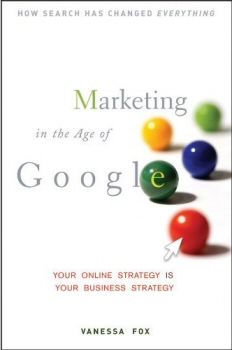Vanessa Fox works as Entrepreneur-in-residence with Ignition Partners but is especially well known in the Search Marketing world because of her past work as Google’s search engine strategy spokesperson and creator of Google Webmaster Central. I’ve interviewed Vanessa several times on video in the past here, here, here and podcast here but nothing as substantial as what you’re about to read.
Vanessa has a new book coming out called “Marketing in the Age of Google“, which I’ve had the opportunity to preview and it reminds me of how important it is to draw attention to her exceptional insight. My kudos for the book:
“Finally! A C-level book about smarter search engine marketing. Marketing in the Age of Google by Vanessa Fox is undoubtedly, the search marketing bible for senior executives looking to maximize business growth through search engine marketing. This is a must read and if you don’t, your competition certainly will.”
In this interview you’ll discover the importance of SEO strategy, dealing with CEOs and social media, search personas, operationalizing Social Media and SEO, thoughts on upcoming search innovations and her favorite search engine (not what you think).
Let’s start off with an elevator bio: 50 words or less? (Not to be confused with the escalator bio, which is much shorter)
I’ve been involved in user experience, product development, and web development since the mid-90s. I was able to draw on all that background when I worked at Google and built Webmaster Central. We realized that we could provide a lot of key information to site owners (in ways such as diagnostic tools and education) to help them see better results from organic search acquisition. Now post-Google, I’m focused on that same goal.
 Many companies are approaching social media tactically and making big mistakes. There’s a lot of encouragement for corporate social efforts to start with a strategy first. Do you think the same is true with SEO? Are companies approaching SEO tactically with little consideration of a search strategy?
Many companies are approaching social media tactically and making big mistakes. There’s a lot of encouragement for corporate social efforts to start with a strategy first. Do you think the same is true with SEO? Are companies approaching SEO tactically with little consideration of a search strategy?
Oh absolutely. True search strategy is integrated into overall product and business strategy, and too often whoever is responsible for SEO isn’t involved those parts of a company’s planning process. Unfortunately, that means that in some cases, those doing SEO focus on what they can accomplish tactically. Certainly, many tactical elements of SEO decoupled from strategy can improve search acquisition (particularly regarding architecture), but without a strategy, you can only go so far.
For instance, if you’re looking at search acquisition strategically, a large part of your assessment is around what your potential customer base is really looking for and how you can best meet their needs. Where that meeting first happens is often in the search results, but in order to have the potential to show up there, your site needs to provide what it takes to meet those needs, and that often lies beyond the SEO department.
Even with highly technical components, having a strategy can help ensure that you’re tackling the more impactful issues first and that you’re laying groundwork to ensure that any new infrastructure elements are search-friendly from the start. That prevents you from spending all of your time fixing issues that just pop right up again.
How can we get the C-Suite to overcome their fear of change when it comes to the importance search and social media within a marketing strategy?
I think the situation is already starting to change. Many marketing departments already realize that search and social media are important aspects of a comprehensive marketing strategy in today’s online world. The question becomes what to do with that knowledge. Traditionally, marketing has been able to operate well in silos. As long as everyone was working towards the same marketing message and vision, they could build their campaigns separately. But that’s no longer true. Truly effective search and social media strategies are integrated into larger marketing strategies and often that bridge needs to span beyond marketing and into web development as well.
In terms of implementation, it can significantly easier for a marketing department to have an agency build a microsite to support a campaign than to engage directly with the development team, but in terms of effectiveness, it’s more difficult to truly integrate search and social media.
“SEO isn’t voodoo or magic or spam.”
Some key things to consider are:
- The consumer experience – can the consumer easily engage with your brand if each social media site you are active on leads back to a different domain and has different goals? If the consumer is engaging on microsites named for particular campaigns, are they getting positive brand reinforcement or just a positive experience with that particular campaign? Do they have a clear path back to the brand or are you just adding confusion? What happens when the campaign ends? In some cases, building social media engagement via a particular campaign and building a microsite to support these efforts can absolutely be effective. But it’s important to make these decisions as part of a broader, more long-term plan and to understand the complexities.
- How search works – SEO isn’t voodoo or magic or spam. But it does require a firm understanding of both how search engines technically crawl and index pages and how searchers behave. The company needs a search advocate who either understands it and can help ensure it’s taken into account during every step of the process, or needs to gain that expertise, whether it’s through hiring a consultant or firm an hiring someone in-house.
- Key metrics – Search in particular is very measurable, key is knowing what to measure and what the metrics mean. With web analytics and search data, you are overwhelmed with hundreds of data points. It’s easy to either dismiss them all or to fixate on certain ones that don’t seem to show progress. While some key pieces of data are important for any business, many of the important metrics tend to depend on your business goals and your customer base. Building an effective framework for measurement can alleviate the hesitation some may feel at expanding into these types of marketing efforts. I still see a lot of powerpoint slides prepared for board meetings that showcase visits to the website as the key metric and that’s almost never the right primary measure.
A lot has changed in search technology and how search results are displayed over the past year or so. Since we’re in the new year, any predications on major changes in the nest 6-12 months?
This is difficult to answer, as we’ve seen a lot of experimentation in the last year and many of the changes will likely be based on the searcher data that results. We’re still watching to see what’s going to happen with Microsoft and Yahoo. If that deal indeed goes through, it’s not clear exactly how that will change things, so a lot is in flux.
For instance, will Yahoo still offer BOSS, which currently powers a number of smaller search engines? I’m not sure that they can without a crawling infrastructure and index of their own.
But certainly we’ll see continued evolution beyond text-based search results. The major search engines have to balance richness against complexity. I find the ability to view search results just from the last week or just from forums, for instance, really helpful, but if those options were front and center, they’d likely confuse many searchers who just want to type into the box and get back an answer.
Of course, the solution Google is skewing towards is personalization. Google will ask for less interaction, but will show you more variety in results based on your online behavior. Microsoft seems to be taking a different tack – they’re also providing more variety (for instance, with categorized search) but are also providing more ways to interact directly within the search results (such as with the Farecast integration).
Please explain the notion of search personas and why they’re important.
Searcher personas and search acquisition workflows are integral to the way I approach search strategy. Before you can start attracting visitors to your web site, you need to know who you are attracting and why. I always start with asking what the goals of the business and the goals of the web site are. From there, we can work backwards to who the company wants to attract to help them meet those goals, and then dive into the goals of that audience.
With that information, we can build searcher personas, which are similar to typical personas, except that they start with understanding what the audience wants to accomplish and what they are searching for. This leads to a user workflow that starts at least two steps before the user accesses the website. And of course, with search and social media, every page of the site is the home page, so the user workflow assessment evaluates each page to determine if it meets the searcher goal and if it draws the visitor deeper into the site to meet the business goal.
Without this framework, it’s difficult to fully realize the potential of search.
“If a company is serious about building search and social media into their organizations, they need to make a real commitment to building that expertise”
Advice given in some Social Media/SEO sessions at conferences can be quite varied from recommendations to automate duplicate content on bookmarking sites to the importance of listening and engagement. What is it that marketers should be paying attention to when it comes to Social Media and SEO?
That’s a broad topic but one thing marketers should think about is how search and social media can work together. When you’re working on a viral campaign, make sure links are designed in a way to provide SEO benefit (via their structure and anchor text). Realize that with search, social media efforts can have long lasting impact beyond the engagement. If you help someone solve a problem, that discussion may later surface in search results for someone else looking to solve that same issue. I’ve seen companies build pages that expire after 90 days.
Any tips on operationalizing SEO or Social Media in organizations? How can companies move from where they are to making SEO part of processes?
This happens as search and social media become a regular part of the business (product development, marketing, customer support, etc.) and not a separate silo. But if a company is serious about building search and social media into their organizations, they need to make a real commitment to building that expertise (through hiring a consultant, training, hiring someone in-house, or some other way of gaining expertise). I’ve seen so many organizations who felt search was important but implemented it ad hoc based on random advice different people would read online (like this interview! 🙂 ) So, while it was great that everyone in the company was empowered to drive SEO, one programmer who decide to add nofollow tags on all the footers, and someone in marketing would change all the title tags to be a certain number of characters, and without a comprehensive strategy, and without any barometer of what was a valuable use of time, the company can feel like SEO was a failure for them.
Let’s say someone reads your new book, Marketing in the Age of Google, and they “get it”. What should they do next to take that appreciation for a strategic perspective and start improving their marketing?
In the book, I provide a number of suggestions for getting started. If the company already has an in-house SEO or consultant, then involve them in high-level strategy discussions. How can search data help influence product strategy? How can the technical team build search best practices into their development process? How can marketing better integrate search acquisition?
If search is new to the organization, it’s probably worthwhile to hire someone to help build a strategy that works for the organization: benchmark where things are, flag any big issues, help build in search best practices at the key points of the organization, develop searcher personas and workflows that can be used as templates for future development.
Once search is built into existing processes, ongoing search strategy is much easier and companies can see much better results.
If you were a search engine, which would you be?
It would be the Urban Spoon iPhone app: always traveling and surrounded by delicious food.
Thank you Vanessa!
Find more about Vanessa’s work online at:
- ninebyblue.com – Online marketing strategy
- janeandrobot.com – Search friendly design patterns for web development
- SearchEngineLand.com – Contributing Editor
- Office Hours – Weekly podcast
- @vanessafox – Twitter



